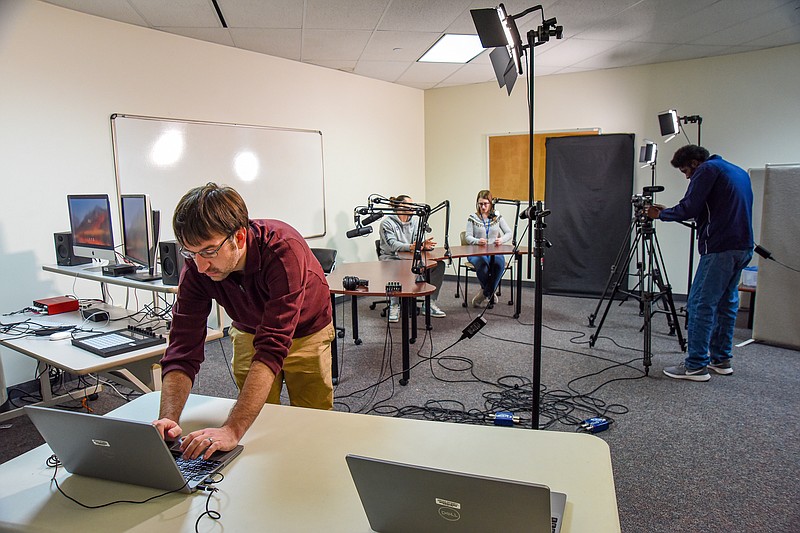Lincoln University students can expect laptops and classroom upgrades next year after the federal government awarded the university a $2.9 million grant.
The National Telecommunications and Information Administration (NTIA) announced Friday that Lincoln is set to receive $2,980,070 from its Connecting Minority Communities Pilot Program, which distributes funds to colleges and universities to expand internet access.
"It's extremely exciting," University President John Moseley said. "Obviously here at the holidays, it's a thrill to get great news like this."
Moseley said the grant money should be enough to provide each of Lincoln's 1,236 full-time students a laptop and add new technology to more than 40 classrooms. That new technology will allow for hybrid or distant learning, he said.
Students will also have the opportunity to check out internet hotspots as needed, Moseley said.
Additionally, Lincoln, a historically Black university, will use the funds to subsidize internet service and equipment for eligible low-income students, hire a full-time student technology coordinator and extend technology support services to evenings and weekends, according to the project description from NTIA.
The new staff member will be responsible for managing the distribution and maintenance of student laptops and hotspots.
Moseley said the grant funding also provides the university an opportunity to consider E-books for course materials in some classes, which could reduce costs for students.
He said the upgrades should be noticeable around campus next fall semester.
The NTIA grant covers two years. Moseley said the university will need to explore over the next few years how sustainable it is to provide each student a laptop.
"We look forward to evaluating the success of it," he said. "If there is a noticeable increase in student performance, it puts even greater emphasis on ensuring that opportunities like this exist beyond the two-year mark."
Lincoln has put a heavier focus on student success and retention in recent months. For the past decade, about half of the open-enrollment university's freshmen leave after their first year.
University administrators and the Lincoln Board of Curators discussed the possibility of using federal COVID-19 relief funds to buy laptops in September 2021 but ultimately tabled the discussion without a formal vote.
The plan was to buy 2,000 laptop computers for full-time students, faculty and staff for an anticipated cost of $1,300-1,400 each, putting the total cost to the university at around $2.87 million.
That never materialized as other projects, such as the renovation of Dawson Hall, were prioritized with the COVID funding.
Moseley said receiving the grant money freed the university up from choosing between student resources and campus renovation.
"It's a win-win," he said. "For us, it's a significant boost to what it is that we're providing in the student experience."
Kevin Hughes, acting director of NTIA's Office of Minority Broadband Initiatives, said the agency provides grants to improve student life and create jobs in local communities.
"Minority-serving institutions are driving digital skills education and workforce development programs for communities across the country, and that's why they need resources," Hughes said in a news release.
A student's financial situation, home location and technological education or experience can all be barriers to accessing internet services for educational support, Moseley said. Having appropriate technology tackles one barrier, he added.
"We want to do as much as we can to ensure that we reduce as many barriers as we can to helping students," Moseley said.
The Connecting Minority Communities Pilot Program is a $268 million grant program supporting historically Black colleges and universities, tribal colleges and universities and other minority-serving institutions. The funds can be used to buy internet service and equipment or hire and train IT personnel.
It's awarded more than $51.9 million through 19 grants.
Lincoln is one of five HBCUs to receive a grant, which are announced on a rolling basis. It's the only recipient in Missouri so far.
The technology upgrades keep Lincoln from falling behind other institutions of higher education, Moseley said.
In a news release, Gov. Mike Parson said the NTIA investment touches on two of his administration's priorities: workforce development and broadband expansion.
"Preparing the next generation of leaders is vital to Missouri's future, and we appreciate the NTIA's support for students at Lincoln University," Parson said. "With a rich legacy as one of Missouri's two historically black colleges, Lincoln University holds a special place among our state's higher education institutions."
Earlier this month, Missouri received nearly $3 million from NTIA for broadband development planning.
The state received $827,338 from the agency's State Digital Equity Planning Grant Program and $2,147,304 from its Broadband Equity, Access and Deployment Planning Grant Program.
The state's Broadband Development Office will use the funds to conduct community engagement, do research, and collect and analyze data. That work will culminate in a five-year action plan and statewide digital equity plan.
Missouri will receive additional federal broadband money through the Bipartisan Infrastructure Law in coming months.
The Show-Me State's share of federal funding is at least $100 million but could be more depending on the makeup of the broadband coverage map, a draft of which was recently released by the Federal Communications Commission.
The public has until Jan. 13, 2023, to file challenges to the map, which are intended to correct coverage inaccuracies. Missouri's portion of the $42 billion appropriation is determined by access needs, meaning the finalized map could result in more funding for the state.

